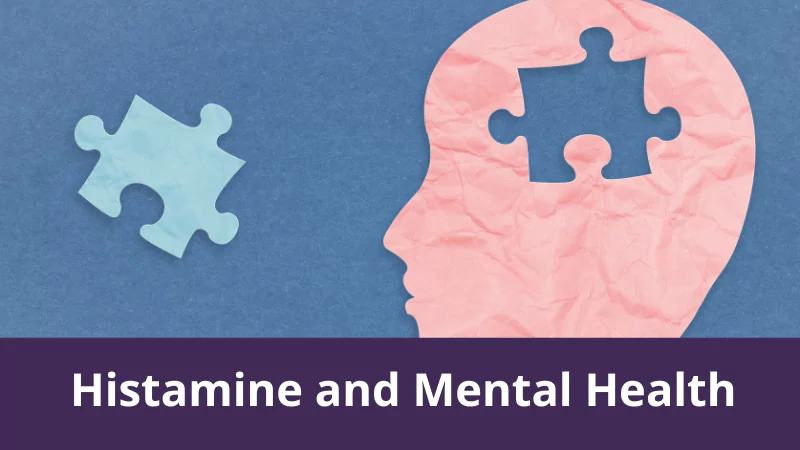How Histamine Levels and Stress Impact Anxiety: Understanding the Vicious Cycle

There is a close relationship between histamine and anxiety. In fact, stress levels and histamine release influence each other. And your brain could influence everything, from your sleep to histamine allergy symptoms. Especially in severe cases, such as panic attacks, anxiety, and depression.
So, whether it’s constant anxiety or sporadic, even severe cases, let’s explore the relationship between histamine and anxiety. And how stress and histamine release could create a vicious circle damaging your body.
Where is histamine found?
Histamine is an essential neurotransmitter that impacts the digestive, immune, and central nervous systems. There are four types of histamine receptors located throughout the body:
- H1 receptors are present in cells involved in inflammation and allergic responses.
- H2 receptors can be found in the stomach, where histamine is involved in releasing gastric acid as part of the digestive process.
- H3 receptors are primarily in the brain, where histamine acts as a neurotransmitter.
- H4 receptors are found in a wide range of organic tissues and participate in histamine interaction with key granulocytes, such as mast cells.
When histamine increases and accumulates
While histamine is an essential component of a healthy body, research suggests that at least 1% of the population suffers from histamine intolerance. When histamine accumulates excessively, it can trigger a myriad of seemingly unrelated and debilitating symptoms.
Many of us are familiar with the term ‘histamine’ regarding allergies, but its context for its role in a broader range of disorders is often poorly understood. Since histamine mainly travels through the bloodstream, it can have a vast influence on the intestine, brain, skin, and heart, often experienced with anxiety, panic attacks, and even insomnia.
What causes histamine intolerance?
Histamine intolerance results from an excess of histamine in the body. When there is a mismatch between the amount of histamine released and the body’s ability to metabolize it, histamine accumulates in the system, often triggering a myriad of bothersome symptoms.
There are many causes of histamine intolerance; here are some of the main ones:
Mast cell release: As part of the body’s natural immune response, when an allergen is detected, it binds to immunoglobulin-E (IgE) antibodies, signaling the body’s mast cells to release inflammatory substances like histamine. In this case, a good mast cell stabilizer can act as a ‘miracle in a bottle’ to reduce symptoms and increase food tolerance.
Diamine oxidase (DAO) deficiency: DAO is an enzyme in the intestine that regulates the reabsorption of histamine in the gut. When DAO is inhibited, histamine cannot be properly broken down, and thus, histamine levels in the body increase. In this case, you can try natural ways to increase DAO enzymes.
Intestinal dysfunction: Since histamine is produced and broken down in the intestine, compromised gut health can cause imbalanced histamine levels. For this reason, there is often a relationship between symptoms of bacterial overgrowth, irritable bowel syndrome, intestinal leakiness, and intestinal intolerance. In this case, using a safe histamine probiotic is a good starting point to improve gut health.
Regardless of the main cause, one thing is certain: anxiety is a negative element that can increase histamine release during moments of stress and significantly worsen symptoms.
Histamine and anxiety
Stress, in particular, can be a problem for those suffering from histamine intolerance, as it can trigger an increased release of histamine, often exacerbating present symptoms.
What happens to the body when under stress
When the body is under stress, it releases the stress hormone cortisol, which calls the nervous system into action. The hypothalamic-pituitary-adrenal axis is then stimulated by the nervous system, putting the body into ‘fight or flight’ mode.
This cascade of events signals to the body that it is under attack, and therefore, all its resources are poured into energy conservation, causing the halt of energy processes like digestion.
Subsequently, the sympathetic nervous system is engaged; releasing neurotransmitters like adrenaline, noradrenaline, and dopamine to sharpen senses and put your body on alert for danger.
As part of this stress response, the sympathetic nervous system can further activate the immune system, leading to mast cell degranulation and the release of even more histamine into the bloodstream.
Histamine and stress are related
Stress increases histamine release. While these evolutionary mechanisms are advantageous when the body is under significant external threat, the real problem occurs when this stress response is habitually triggered due to the various environmental and psychological stressors we are often exposed to.
The cycle of histamine and stress response can increase histamine release, which can trigger a series of symptoms, including:
Histamine, anxiety, and depression:
Histamine and stress can cause significant mood disorders due to histamine’s role in the brain. The presence of H3 histamine
receptors in the brain explains the high incidence of mood disorders in those who are histamine intolerant.
In the brain, histamine acts as a neurotransmitter that can influence the levels of mood-altering neurotransmitters like GABA, dopamine, and serotonin, causing increased expression of anxious and depressive feelings.
Histamine and Insomnia:
Histamine has been implicated at the forefront of sleep disorders; both in cases of insomnia and excessive sleepiness. Recent research reveals that histamine can indeed play a crucial role in the circadian rhythm.
It has been found that activation of the H1 histamine receptor promotes sleep, while activation of the H3 receptor stimulates increased wakefulness.
Firstly, the connection between histamine and stress not only disrupts the sleep balance and promotes insomnia. But also, the lack of sleep can cause an increase in stress and histamine release, thus cyclically worsening these issues.
Histamine and Panic Attacks:
In conditions of excessive histamine levels, many people report experiencing regular and debilitating panic attacks. These panic attacks can be partially attributed to the role of histamine in vasodilation or the widening of blood vessels in the heart.
This function causes a drop in blood pressure as blood flows more freely through the newly widened vessels. Heart rate increases to continue pumping a consistent level of blood through the widened vessels.
Reduced blood pressure coupled with increased heart rate can lead to:
- Shortness of breath
- Dizziness
- Rapid heartbeat as if experiencing a panic attack.
Once again, the connection between histamine and anxiety can worsen problems like panic attacks, with the added issue that both stress and histamine release increase together.


